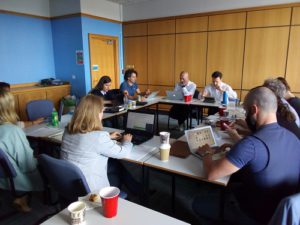 By Susan Beth Rottmann (Özyeğin University)
By Susan Beth Rottmann (Özyeğin University)
The research challenges that RESPOND faces are enormous. It is an ambitious project involving research in 11 countries with migrants from the Middle East, Africa and Eastern Europe who speak more than 15 different languages! It also involves research with stakeholders who work in many different areas of migration management from border control to protection to housing and labor market integration. The goal of the project is to sift through this diversity—to make sense of it—in order to understand where policies are failing and succeeding and, ultimately, to make policy recommendations. Given this scope, how can we ensure that the information gathered through interviews with diverse migrants and stakeholders will be comparable and useful? RESPOND researchers are political scientists, legal scholars, sociologists and anthropologists, each with their own methodological knowledge. How can their expertise be integrated to ensure that that research is conducted with cultural, gender and psychological sensitivity? What best practices for conducting research with victims of trauma will the project implement? These are just some of the questions that RESPOND researchers debated at a meeting on May 25 and 26th at Glasgow Caledonian University.
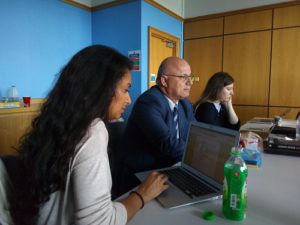 One of the major issues to address had to do with how migrants are selected to participate in the research (what is called “sampling” by academics). Each of the 11 country teams prepared plans to include migrants in their sample based on the criteria of being a member of one of the three largest communities of forced migrants in their country. It is important to have uniformity in sampling or the research data collected might not be comparable. But, each country does not have the same relation to forced migration. For example, Iraq, can be considered a source and transit country, in which migrants originate and travel through to other destinations. However, Turkey is a source and transit country and also a destination country, with some migrants deciding to settle there permanently. Still others, like Germany and Sweden, are only destination countries. Given this diversity, researchers decided to allow flexibility in sampling criteria. For instance, it was decided to study internally displaced people in Iraq, but not in other countries. It was also noted that family reunification migration is very important to study in Sweden. While still maintaining a goal of comparability, the researchers decided that capturing the richness and complexity of the countries included in the project was the most important goal.
One of the major issues to address had to do with how migrants are selected to participate in the research (what is called “sampling” by academics). Each of the 11 country teams prepared plans to include migrants in their sample based on the criteria of being a member of one of the three largest communities of forced migrants in their country. It is important to have uniformity in sampling or the research data collected might not be comparable. But, each country does not have the same relation to forced migration. For example, Iraq, can be considered a source and transit country, in which migrants originate and travel through to other destinations. However, Turkey is a source and transit country and also a destination country, with some migrants deciding to settle there permanently. Still others, like Germany and Sweden, are only destination countries. Given this diversity, researchers decided to allow flexibility in sampling criteria. For instance, it was decided to study internally displaced people in Iraq, but not in other countries. It was also noted that family reunification migration is very important to study in Sweden. While still maintaining a goal of comparability, the researchers decided that capturing the richness and complexity of the countries included in the project was the most important goal.
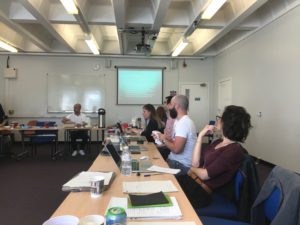 Another significant issue had to do with how to formulate interview questions. Formulating interview questions is always a challenge for social scientists. Some questions that researchers would like to ask may not be understood by interviewees or will not generate the rich, in-depth narratives desired. To address this issue, the team conducted pilot interviews before the meeting. Drawing on these field experiences, they decided to develop a more flexible and open interview guide. For example, broad questions about migrants’ journeys will be favored over detailed questions about regulations and procedures. One of RESPOND’s goals is to maintain a refugee-centered approach, and this manner of interviewing will highlight refugees’ points of view to the fullest. It was also decided to incorporate sensitivity to gender throughout the interview, rather than only asking a few specific questions on the topic.
Another significant issue had to do with how to formulate interview questions. Formulating interview questions is always a challenge for social scientists. Some questions that researchers would like to ask may not be understood by interviewees or will not generate the rich, in-depth narratives desired. To address this issue, the team conducted pilot interviews before the meeting. Drawing on these field experiences, they decided to develop a more flexible and open interview guide. For example, broad questions about migrants’ journeys will be favored over detailed questions about regulations and procedures. One of RESPOND’s goals is to maintain a refugee-centered approach, and this manner of interviewing will highlight refugees’ points of view to the fullest. It was also decided to incorporate sensitivity to gender throughout the interview, rather than only asking a few specific questions on the topic.
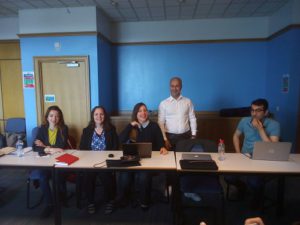 Concerns about ethics and the psychological impact of research on research participants and researchers are at the forefront of all social science research. But these concerns are never more central than when working with individuals who lack access to important resources or who face discrimination because they are refugees, ethnic or religious minorities, unemployed or without legal status. RESPOND researchers discussed the importance of sensitivity to the trauma that vulnerable groups have experienced and the need to refer individuals to psychological support services if necessary. Protecting personal data, establishing trust and ensuring that false expectations are not created for interviewees is critical, and researchers shared their strategies in this regard. For example, researchers noted that there may be gatekeepers who arrange interviews for them in the field, but the relationship between these gatekeepers and those who will be interviewed must be carefully examined to make sure that the gatekeeper is not exploiting the person who is being interviewed or shaping the research in some way. The psychological experience of interviewing forced migrants for the interviewer was also discussed. Researchers agreed that debriefing after interviews and processing any unexpected occurrences through journaling, meditation or other strategies will be important.
Concerns about ethics and the psychological impact of research on research participants and researchers are at the forefront of all social science research. But these concerns are never more central than when working with individuals who lack access to important resources or who face discrimination because they are refugees, ethnic or religious minorities, unemployed or without legal status. RESPOND researchers discussed the importance of sensitivity to the trauma that vulnerable groups have experienced and the need to refer individuals to psychological support services if necessary. Protecting personal data, establishing trust and ensuring that false expectations are not created for interviewees is critical, and researchers shared their strategies in this regard. For example, researchers noted that there may be gatekeepers who arrange interviews for them in the field, but the relationship between these gatekeepers and those who will be interviewed must be carefully examined to make sure that the gatekeeper is not exploiting the person who is being interviewed or shaping the research in some way. The psychological experience of interviewing forced migrants for the interviewer was also discussed. Researchers agreed that debriefing after interviews and processing any unexpected occurrences through journaling, meditation or other strategies will be important.
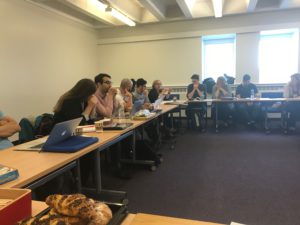
We feel that the meeting established a strong foundation for RESPOND’s upcoming fieldwork. We were able to address each of the above mentioned challenges to a great extent. But, we would love to know what you think about these topics! In your research or policy-making, how have you balanced the issue of cross-country comparison and contextual specificity? What are your techniques for developing interview questions? Can you share any of your own strategies for managing fieldwork relationships? Please share your insights on these or other topics in the comment section below.
